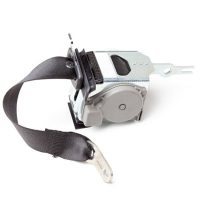Where Do Seatbelts Get Their Safety Superpowers?

“Seatbelts save lives” has become such a proverbial expression that hardly anyone gives much thought to how seat belts harness their life-preserving power. The current generation of newly licensed drivers has been buckling their seat belts for as long as they have known how to tie their shoes, as has the current generation of driver’s ed instructors. Despite that, at any given time, only about one in ten motor vehicle passengers is not wearing a seatbelt, riders without seatbelts account for more than 40 percent of traffic fatalities. Seatbelts have improved a lot since their debut. Any seatbelt is better than none, but some seatbelts are better than others. A Columbia car accident lawyer can help you if you have suffered serious injuries in a car accident, even though you were wearing a seatbelt.
Anatomy of a Modern Seatbelt
The seatbelt is one of the simplest safety features in a car, but it is also the most effective at preventing severe injuries in the event of a collision. Seatbelts have prevented many deaths and catastrophic injuries simply by existing. Even a simple lap belt, the oldest kind of seatbelt, prevents you from being ejected from the car in an accident, sparing you the worst injuries.
Of course, successive models of cars have seen many upgrades to seatbelt technology. In the 1980s, rear seats had lap belts only, but front seatbelts consisted of a lap belt connected to a length of belt that crosses the torso like a sash. This basic design has remained the standard, except for a brief fad in the 1990s, when some cars had the lap belt and the shoulder harness as separate pieces. Today, you find the “single belt that crosses the hips and chest” belt design in the front and rear seats of virtually every car on the road. Even though all of these seatbelts look alike, there is some variation in how they work.
Can seat belts cause injury? Not like being ejected from a vehicle, but yes. Superficial injuries and muscle sprains can result from a seatbelt restraining you in a collision. Therefore, today’s most advanced seatbelts have pretensioners and load limiters to prevent seat belt-related injuries. Pretensioners, also called tensioners, cause the belt to tighten even more when they sense sudden forward movement, as in a collision. By themselves, pretensioners can cause injury if they engage quickly, as they do in a collision or near-collision event. To prevent pretensioner-related injury, vehicle manufacturers have started installing seat belts that also have load limiters. Load limiters act as a countermeasure to the pretensioner, limiting the amount that it can tighten. The newest vehicles have the safest seat belts, but even your vintage ride with its simple seatbelts is doing wonders to keep you safe.
Let Us Help You Today
The personal injury lawyers at the Stanley Law Group can help you if you got injured in a car accident where you were wearing a seatbelt. Contact The Stanley Law Group in Columbia, South Carolina or call (803)799-4700 for a free initial consultation.

